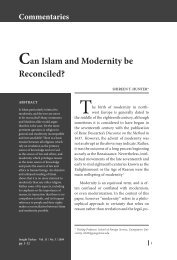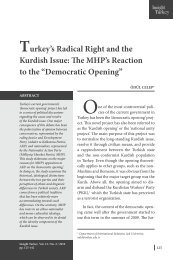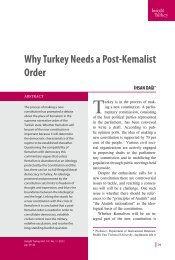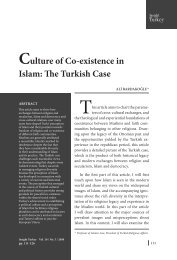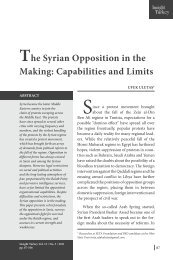Black Turks, White Turks: On the Three ... - Insight Turkey
Black Turks, White Turks: On the Three ... - Insight Turkey
Black Turks, White Turks: On the Three ... - Insight Turkey
Create successful ePaper yourself
Turn your PDF publications into a flip-book with our unique Google optimized e-Paper software.
MÜCAHİT BİLİCİ<br />
Turkish secularism in practice amounts to control and suppression of nonstate<br />
Islam. The binary opposition that dominates most of <strong>the</strong> literature on Turkish<br />
secularism <strong>the</strong>refore pits “political Islam” against “<strong>the</strong> secular state.” Yet this is<br />
surely a misnomer. In contemporary <strong>Turkey</strong>, <strong>the</strong> two competing currents should<br />
rightly be identified as state Islam versus civil Islam—or simply as state elites representing<br />
a nineteenth century authoritarian ideology versus <strong>the</strong> masses who demand<br />
<strong>the</strong> new standards of liberal democracy. It is not an opposition between<br />
tradition and modernity, or between Islam and secularism. Ra<strong>the</strong>r it is between an<br />
old conception of modernity (as a top-down authoritarian process) and a newer<br />
one (bottom-up grassroots democracy). The inherent contradiction in Turkish<br />
modernization is that it has included both currents of top-down modernization<br />
and bottom-up democratic participation. Arguably, today <strong>the</strong> top-down modernization<br />
has reached a limit where its claims to progress are in conflict with its<br />
promises of democracy. How else can we explain <strong>the</strong> paradoxical situation where<br />
<strong>the</strong> most enthusiastic supporters of <strong>the</strong> EU are not conventional modernizers (<strong>the</strong><br />
Kemalists) but <strong>the</strong> very victims of <strong>the</strong> Kemalist project, among <strong>the</strong>m <strong>the</strong> Kurds<br />
and religious people?<br />
<strong>Black</strong> <strong>Turks</strong> II: Religious Women (and Men)<br />
Today <strong>the</strong> most contentious violation of <strong>the</strong> human and citizenship rights<br />
of religious people is <strong>the</strong> ban on <strong>the</strong> headscarf. A survey conducted by Bogazici<br />
University and <strong>the</strong> Open Society Foundation revealed that 93 percent of Turkish<br />
people have no problem with <strong>the</strong> headscarf (Zaman, March 11, 2006). A majority<br />
of people in fact consider <strong>the</strong>mselves “religiously conservative” but ask for<br />
change and more political liberties. Many Turkish women, rural and urban, wear<br />
headscarves. Yet <strong>the</strong> notorious ban on <strong>the</strong> headscarf has persisted since <strong>the</strong> last<br />
military coup in 1997, when <strong>the</strong> military ordered public institutions to deny access<br />
to students and public servants who wear <strong>the</strong>m. (Strange as it may seem, <strong>the</strong><br />
Turkish prime minister’s daughter does not have right to go to university in <strong>Turkey</strong>.)<br />
The ban on <strong>the</strong> headscarf has been so strict that efforts to get around it have<br />
been countered by increasingly drastic measures. Not only students who wear <strong>the</strong><br />
headscarf but also those who wear wigs in an effort to accommodate official demands<br />
while still covering <strong>the</strong>ir hair are in some cases prevented from attending<br />
university.<br />
<strong>On</strong>e of <strong>the</strong> victims of discrimination against headscarf-wearing students, Leyla<br />
Sahin, took her case to <strong>the</strong> ECHR and argued that her right to education had<br />
been violated. The ECHR decided that <strong>the</strong> Turkish state’s ban on <strong>the</strong> headscarf was<br />
not a violation of her right to education. Accepting all assertions of <strong>the</strong> Turkish<br />
32



